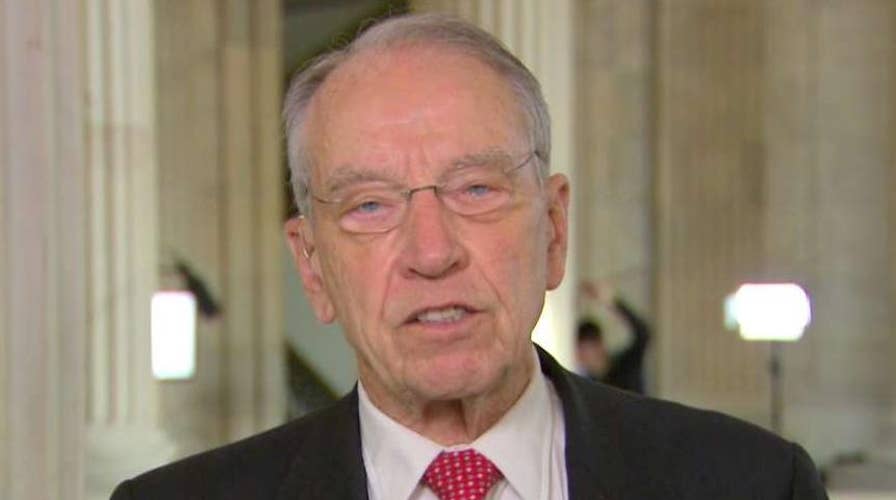Imagine you're a surgeon but terrible at your job.
You botch operations regularly and have a dreadful bedside manner. Soon, your bad reputation will spread. Few new patients will choose your practice.
So how can you boost business? Well, you might offer local primary care doctors a deal. If they send patients your way, you'll give them a 20 percent kickback. That would ensure a steady stream of customers.
DR. MARC SIEGEL: 'MEDICARE-FOR-ALL' IS A WRECKING BALL TO EMPLOYER-BASED PRIVATE HEALTH INSURANCE
Fortunately, that wouldn't just be unethical -- it'd be illegal. The federal government has long banned such kickbacks, except in one area of health care: prescription drugs.
When it comes to pharmaceuticals, "kickbacks-for-patient-flow" deals aren't just legal, they're the norm. Each year, drug companies offer lucrative kickbacks to insurers and vendors known as pharmacy benefit managers (PBMs). In return, insurers and PBMs steer patients towards a particular company's brand-name drugs, even if a different company's medications are cheaper or more effective.
The Trump administration recently proposed a rule to outlaw these shady kickbacks. This reform would force drug companies to compete against one another to offer the best prices directly to patients.
Here's how the drug supply chain works today. Pharmaceutical companies pour billions of dollars into research projects in the hopes of developing a drug. If that experimental medication ultimately receives FDA approval, the company rushes to sell as much of it as possible in the ensuing years before the patent expires and cheap generics flood the market.
But before the company can start making big sales, it must first convince insurers to cover the medicine. After all, if health plans don't cover the drug, it's unlikely many patients would opt to pay for it entirely out-of-pocket.
As a result, drug companies are willing to offer significant discounts to pharmacy benefit managers -- the massive, secretive companies hired by insurers to decide which drugs are included and excluded from health plans. In 2017, pharmaceutical firms dished out roughly $150 billion in discounts and rebates.
These rebates and discounts usually reduce a drug's original sticker price by 26 to 30 percent. But sometimes, the discounts are far greater. For instance, many different pharmaceutical companies sell insulin. To convince PBMs to cover their particular brand of insulin and steer patients toward it, drug companies often offer discounts in excess of 70 percent.
When insurers and PBMs decide to cover a drug depending on how large a discount the manufacturer offered -- rather than how well the drug works for patients -- it distorts the free market. Pharmaceutical companies compete based on who can offer the biggest kickbacks, not who can offer the best products.
Worse, these rebates and discounts don't even reduce patients' out-of-pocket costs at the pharmacy. Insurers and PBMs force patients to pay copays and coinsurance on the original, undiscounted price of the medicine. An insulin prescription with a $300 sticker price might only cost insurers $100 after discounts. But patients would pay coinsurance -- a fixed share, often 25 percent, of a drug's sticker price -- on the full $300.
In other words, patients would pay $75 for that prescription. Insurers might shell out just $25 in total after applying discounts and rebates and collecting the coinsurance from patients.
This hidden system of kickbacks explains why, even though rebates more than doubled between 2013 and 2017, many patients have seen their out-of-pocket drug costs increase. And it's why insurers and PBMs have set record profits.
The Trump administration wants to upend this corrupt system by revising the federal anti-kickback statute -- the measure that prevents crooked deals between healthcare providers, including surgeons and family doctors.
Under the administration's proposed rule, it would be illegal for PBMs and insurers to accept discounts and rebates in exchange for steering Medicare and Medicaid patients towards a particular drug. The rule would create one exception to this prohibition -- the rebates would be lawful if insurers pass them to patients at the point of sale.
CLICK HERE TO GET THE FOX NEWS APP
Thanks to the rule, patients would enjoy lower copays and coinsurance. Medicare beneficiaries could save as much as $1.4 billion next year alone. From 2020 to 2029, those savings could total up to $25 billion.
Just as important, the reform will introduce more transparency and competition into our healthcare sector. It will finally force drug companies to offer the best value to patients -- not to insurers and dubious middlemen.
